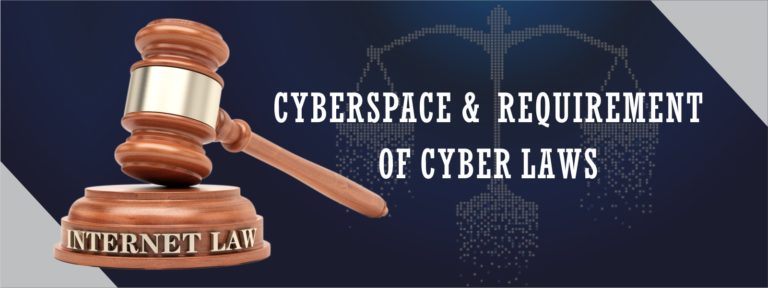
Cyber Space and the need for cyber laws
Cyberspace is a concept describing a widespread, interconnected digital technology. Cyberspace is a virtual medium with no boundaries or geographical mass or gravity. Cyberspace can also be treated as a natural extension of physical world into an infinite world.
The word became popular in the 1990s when the uses of the Internet, networking, and digital communication were all growing dramatically and the term cyberspace was able to represent the many new ideas and phenomena that were emerging.
Need for laws in cyberspace?
“Technological progress is like an axe in the hands of pathological criminals”. aptly said by Albert Einstein.
New technologies create new criminal opportunities but few types of crime. What distinguishes cyber crime from traditional criminal activity? The difference lies in the fact that in case of cyber crimes the criminal uses a digital computer or network.
Therefore, technology is the only distinguishing factor that might exist between different realms of criminal activity. Criminals do not need a computer to commit fraud, traffic in child pornography and intellectual property, steal an identity, or violate some one’s privacy. All these criminals activities existed before humankind came to know about cyber space.
Therefore, cyber crime represents an extension of traditional criminal behaviour in cyberspace, of course, alongside some novel illegal activities. Therefore, any kind of criminal behaviour done through computers and Internet is termed as cyber crime.
Internet technology is rapidly becoming a necessity of modern social and economic life. It is opening opportunities and new avenues for each and every individual member of society.
Internet is an open source. Therefore, it is open for exploration and at the same time, it has the potential to lead to exploitation. Rules and regulations for physical transactions are not sufficient enough for transactions and dealings on cyber space. There are no enforcement agencies to enforce rules and regulations and protect people from the cyber crimes.
Therefore, there is need for enactment and implementation of cyber laws to regulate crimes in the cyber space.
Hart in his work The Concept of Law has said “Human beings are vulnerable, so Rule of Law is required to protect them.”
Similarly, we may draw that “Computers are vulnerable, so Rule of Law is required to protect them against cyber crimes.”
Cyber Laws
United Nations Commission on International Trade Law (UNCITRAL) adopted “Model Law on Electronic Commerce”
India enacted the Information Technology Act, 2000 based on this model law, which came into force on 17 October, 2000.
This is “an Act to provide legal recognition for transactions carried out by means of electronic data interchange and other means of electronic communication, commonly referred to as “electronic commerce” which involve the use of alternatives to paper based methods of communication and storage of information, to facilitate electronic filing of documents with the Government agencies.”
IT Act was further amended in 2008 to include additional focus on information security several new sections including Cyber terrorism and Data Protection.



